- Home
- Adele Griffin
Rainy Season Page 2
Rainy Season Read online
Page 2
Ted looks at me skeptically. “See, that’s just what I’m talking about. Fussiness.” He slaps the album shut. “I think I just heard a car door slam.”
I leap to the window and once I see that it’s Mom and Alexa, I can feel my worries squeeze out of me like hot water from a washcloth.
“Why are you being so friendly?” Mom asks with a smile. As soon as she walks inside, I have her in a clutch; it’s babyish and I know Ted and Alexa are watching, but I bury my face in her shoulder. Mom sets down her shopping bags and returns my hug, although her eyes quiz me.
“I thought there was trouble downtown. Dad told me.” I let go of her; Mom crosses her arms over her chest and shakes her head.
“Well, it’s sweet of you to be concerned, Lanie, but we both know very well that this is exactly the kind of thing …” Her voice dies away at the sight of Ted, who waves at her from the loveseat.
“Heya, Duchess.”
“Well, if it isn’t Mr. Tie!” Mom’s face relaxes back into a smile and she nods to his drink. “No beverages on the furniture.”
“Argghhh.” Ted stands, resting his weight on one leg, then tips back his head and drains the bottle like he’s on a television commercial.
“Theodore, doesn’t Dee have enough bread and water that you don’t have to schlep around here on the dole?” asks Alexa, settling herself carefully into a spindly-legged chair.
“Dee’s an unfit mother,” Ted smirks. “You should know—you trained her.”
Alexa laughs in a giant rumble. Ted’s mom Dee and Alexa used to be something wild growing up on the Zone—I’ve heard lots of crazy stories. She and Dee and their Zonie friends were always up to strange things like water-skiing through the Pedro Miguel locks or racing their jeeps over the Fort Davidson golf course.
“You are so brutal to me, Teddy Tie. Isn’t it Friday today? Why aren’t you in school? Rain didn’t blow down the doors over at Escuela Balboa too, did it?”
“It’s called a sick day, Alexa. More interesting things to do than geometry, right?” Ted jams the hands of his crossed arms under his armpits and lifts his shoulders and his eyebrows. “Just don’t tell Dee. I’m thinking you can keep a secret.”
“Well, stop thinking. And why do I have a feeling you’ve put in for a whole sick week?” Alexa shakes a finger at him, but it wouldn’t even cross her mind to tell Dee. Dee doesn’t care whether Ted goes to class or the beach; one thing I’ve learned here is that school isn’t so much taught on the Zone as it’s just tolerated, like the rains.
“So Ted, what’s the lowdown on Jennifer Elwig—or do you have a new flavor of the week?” Alexa is always way too curious about everybody’s love life.
“Believe me, I’m still smitten. She’s old, though—two years too old for me. I might call her if I’m feeling deliriously brave,” Ted jokes. “Since you and the Duchess both are taken.”
“Oh you hush, you bad thing.” Alexa turns her head and flutters her eyes. It’s plain that she likes his flattery, though, which makes me feel kind of sorry for her and kind of amazed.
It’s weird how parents and other grownups love Ted. It’s partly because he’s nice to look at—tall and tan with gold flecks in his hair and eyes. Mostly though, he’s just so comfortable inside himself that he brings out a comfortable feeling in other people. Ted’s a kid you always meet with exclamation points—“Hey! It’s the man! Tie! Whatsup, Ted!”—even if you don’t normally speak that way.
Mom never even minds that he calls her the Duchess. He named her from his poster of David Bowie, who Ted told me sometimes is called the Thin White Duke. I’ve seen that poster in his room, and Ted’s right, Mom looks just like it: she’s long and flat and pale, with prickly yellow hair and a bony face like a greyhound dog, like David Bowie. Mom also wears men’s clothes; always flared jeans and pantsuits and button-down shirts. No makeup, either. The only time I ever saw her wear a really nice dress was in photos from when she and Dad got married. She says pants are her rebellion against her Virginia upbringing, when she had to wear skirts and pantyhose, even on the weekends.
Alexa is Mom’s opposite; she wears sparkly eyeshadow and her long black hair looks like it was carved into its polished knot. Alexa also likes to dress in floor-length swishy things. Today the swishy thing is green and it sticks to her body like Plasti-Rap. The whole effect reminds me of a peeled avocado.
“Where’re the men?” Mom asks.
“At the jump. Marita’s out, shopping.” Now I’m sort of depressed that I didn’t go to the jump when I had the chance.
Alexa looks crabby. “Marita’s not here? Then we’ll have to go out, Abby, like to the Officer’s Club.” She pats her stomach. “I’m famished.”
“Don’t be crazy,” Mom starts heading to the kitchen. “You forget I’m from the U.S. of A. I still know how to slap a piece of cheese between two slices of bread.”
Alexa wrinkles her nose and starts to say something, but then stops and turns to Ted. “So is Dee on for the party tonight?”
“There’s a party here tonight?” Ted looks at me.
“I didn’t know,” I say. We both turn to Alexa, who laughs.
“That’s because Abby and I decided on it this morning.”
“Is that enough time to get all the food ready?”
“Oh no, no, no, silly girl—we’re having it catered. It’s someone else’s problem—we just show up, eat, and go home!” Alexa starts really cracking up now, although no one else is joining in. “But I do need to get on the horn and ring up the gang.” She sighs when she recovers.
“Hey, Lane, we should go see the jump,” Ted says. “Dee and Grant took the Toyota to the Atlantic side to go scuba diving, so we’ve got Grant’s truck for the whole day. And we can recruit more builders while we’re over at McKenna.”
“I need to change first. I’m still in my nightgown.”
“Hurry up then. Day’s wasting.”
“Ten minutes.” I sprint to my room to get ready before Ted becomes impatient and takes off without me, which he’s been known to do in true Zonie style.
3
I TAKE A COLD shower to get ready for the heat, then I pull on my bathing suit and a cotton sundress. My sandals, once white, are still pretty damp from when I stomped them through yesterday’s rain puddles. I squish them on anyway.
I sit on my bed and try scraping a comb through my wet hair. Once Emily told me I had thick movie star hair, although all I see is mouse brown to match my mouse gray eyes. Sometimes, right after I’d washed it, she’d wind it into a French braid. When it dried, she’d unravel the braid into bumps and waves.
There’s a picture somewhere; me in a movie star pose with my unbraided hair spread all over my shoulders, and then Emily in the back holding a bottle of hairspray and wearing a cowboy hat, pretending to be the Hairdresser to the Stars. “Dahling, you must stop by my saloon!” she scribbled on the corner of the picture. Sometimes I wonder if she spelled it saloon because of the cowboy hat, or had meant to write salon like a hair salon. Either way, it’s funny.
I’ll have to finish the letter I started writing to her in my journal. It’s been almost a month since I wrote a letter to Emily.
I give up on the comb, wiggling my fingers down through the knots and snags as I rejoin the others in the living room.
“I’m ready.”
Ted jumps up and swipes another half of cheese sandwich from the platter Mom must have prepared. “Let’s motor. Got your pass?”
I pat the side slit pocket of my dress.
“Lane, when you see Dad, will you tell him about tonight but ask him please don’t invite anyone yet, since Alexa and I are still making the list?” Mom points a warning finger at me.
“Okay.”
“And drive carefully, Ted,” she adds. She’s still not used to the idea that Zonians don’t think they need to be a certain age to drive. Military kids, like me, all have to follow the laws of the American government. No questions asked. But Ted’s lucky; even th
ough he’s an American citizen, living on the Panama Canal Zone is pretty different from living on an army base.
The whole Zone’s nearly 650 square miles. And while the 14 bases built along the Zone are all very regulated and orderly, the Zone has real neighborhoods, with lawns and garages and barbecue grills. As far as neighborhoods go, they’re pretty average-American looking, except for being built in the middle of the jungle, and most Zonians are more likely to keep boats, trucks and jeeps in their garages, instead of cars.
Almost everyone who lives on the Zone works for the government, mostly for the Pan-Canal Company. Ted’s dad, Grant, is a lock-switch operator. Ted only ever leaves Panama to see his grandparents in Miami. Almost all Zonians, once they retire from the Pan-Canal Company, go live in Miami. Ted thinks the whole United States is like Miami—full of mini-golf ranges and old people.
We walk outside, down the front steps and into the shadowless heat. Ted swings his toolbox and whistles. The black plaque, stamped out like a license plate and fixed to our front door screen—#4J LT. COL. BECK—is the one thing that distinguishes our house from all the others on First Street.
Ted looks up. “Gonna rain today.”
I look up, too. “Negative.”
“Around four. You watch.”
I give the sky a double-check and decide Ted is loco.
All the houses on our street are built to look exactly alike; white-walled, double-decked plaster-and-concrete boxes with black metal roofs. Only the General’s house is bigger. It’s at the very end of the road, shaped like three sides of a rectangle and half-hidden behind a prickly hedge and an unfriendly square iron gate. Dad says that military architecture is uninspired, but I like the exactness of all the straight, clean lines.
We skitter down the steep hill to the bottom of the base and I nod and wave to the MP on duty in the control box. Ted salutes, which seems a little bit obnoxious, but very Ted-ish. His truck is parked at the bottom of the hill. It doesn’t have a military pass sticker, since the truck belongs to his dad, so Ted has to park it off-base. You need a pass sticker to drive onto any military base here, and you need an ID card if you want to buy anything from a U.S. government store. It’s strict down here, because the country is in what Dad calls “uneasy time,” especially now with President Jimmy Carter about to give the rights to the Canal over to the Panamanian government. Panama is the first place I’ve lived where I feel that I fit in on the base, but I don’t belong anywhere else; not downtown and especially not on the Zone.
“Hot seats,” Ted warns. “Towel in the pit.”
I dig out the towel and fold it over the vinyl before sitting.
“This thing’s such an old hunk of junk.” I sigh as the truck rattles onto the strip. “Plus it smells like hamburgers.”
“This beauty? This is a priceless ’66 Ford pickup you’re talking about—only one year younger than you.”
“Too old.”
“Yeah, well, so’s this stupid road,” Ted grumbles as the truck clanks over a pothole. “Anything that’s non-military gets low priority around here, I’m telling you. Makes me think about joining the army sometimes. Live on a cushy base like Fort Bryan.”
“You’d make the worst soldier, Ted. For one, you’d always be trying to get out of doing work and stuff.”
“So how does that make me different from anyone else in any other job?” He laughs. “I wonder if I’d be a good construction worker, though. I’d like to learn for myself how to fill some of these potholes.”
We bounce and jolt along the roads that separate Fort Bryan from Fort McKenna. The intersections are swarming with slow-walking venders carrying plastic bags of plantains, limes, and scraggly lettuces. Little boys holding sponges and buckets run to the stopped cars, trying to wash a windshield for a quarter.
“Váyate.” Ted bats his hand out the window. I dig in my side pocket and pull out some change; the boys grab for my money.
“Lane, come on.” Ted snaps. “You give one quarter to one local, you get twenty more holding out their hands. It’s like seagulls.” I know it’s nothing like seagulls, but I keep quiet. Sometimes Ted talks thoughtless like that.
Ted turns onto a back road to get to McKenna; it’s just a strip of dirt that cuts through the jungle. The riding’s actually smoother once we hit the red-packed soil. We drive by a girl and boy, each lugging two plastic milk containers filled with water. The girl stares unsmilingly at our truck but the boy raises one hand and waves and some of his water sloshes out onto the road. I wave back at him. Ted looks irked.
“Wasn’t that local kid asking for a lift?”
“I think he was just waving.”
“They all want lifts, and then they’ll steal your wallet while they’re saying thanks for the ride. You shouldn’t’ve waved.”
“Oh, how many Panamanian kids do you know who have done that to you, stolen stuff from you?” I ask him. Ted scrunches his nose.
“None, but I just know. Locals, man. They hate the Zone and they hate military worse. Think they own the country, just cause they were here first.”
“But they do own—”
“Oh, they do not, not really. They own barely anything.”
“They’ll own the Canal now.”
“That’s a good one. You think the U.S. is really going to hand over the Canal to Panama? It’s just a lot of talk, Lane.” Ted speeds up the truck so that we go flying over a bump and I try to laugh even though going fast always makes me feel sick.
Today marks the second week of November, almost the bottom of 1977. In Rhode Island, where we lived before here, November means cold—a month of bleak sunlight icing the dead grass on our lawn. Down here, November is the rainy season, which means feeling slow and dumb from heat until we’re soaked by the violent relief of a dark afternoon downpour. Right now, though, the sun is screaming hot.
“We live on one of the most boring bases on the Pacific side,” I sigh. “Mom always says the Pacific side’s better than the Atlantic side, since the Pacific side’s close to Panama City with all the good shopping and restaurants. But Fort Bryan’s dull.”
Ted nods. “Yeah, well, it’s a small base. No room for jump grounds or a high school, or a PX or dinner theater like there is on McKenna. But if I had to live on a base, I’d rather do the Atlantic side thing. Gotta love the Caribbean; way better beaches, way cooler scuba.”
“Ugh, I’ll never scuba dive—all those scary fish faces up close.”
“Lane-insane.” Ted shakes his head. “If they took the word scary out of your vocab, you’d be a mute.”
We turn off-road just before Fort McKenna, bumping down the side of a hill so fast that I grip the dashboard. We park just outside the base again, and the walk to the McKenna jump field is enough of a stretch that by the time Dad waves us over, Ted and I are both glazed with sweat.
It looks like almost a hundred people have collected on the field to watch the jump. Everywhere, families lounge on blankets spread over the stubbly grass. A batch of little kids churn up and down the far edge of the field, trying to work a Chinese Dragon kite into the air.
Ted cups his hands over his mouth. “Too much string, kite people!” he yells. “Goofy little squirts,” he says to me.
“Ted!” Dad smiles. He’s sprawled out on a poncho liner. He raises his hand so that Ted can smack him with a high-five.
“Where’s Charlie?” I ask. My eyes scan the sunburnt turf.
“Went to find a bathroom,” Dad says. His eyes are resting on the sky and his hands are propped behind his head. “Sit down, you. I guess Mom made it back in one piece?” He’s teasing me, but I don’t smile. I’m thinking of other things. Last time Charlie and I went to a jump, Charlie swore he’d figure out a way to get Major Brandt to take him up in a plane. My nerves are already jangling.
“When did Charlie leave?” I ask.
“Lane, come on. You heard your dad.” Ted throws himself stomach-down on the poncho and reaches up to tug the hem of my dress. “Sit dow
n with us. It’s so pathetic when you do this.”
“It’s just that last time we went to a jump, he said—”
“We’re not listening to you, Sarah Bernhardt,” says Dad. “Take a seat.”
I drop with a huff, cross-legged, onto the poncho liner. Dad and Mom sometimes call me Sarah Bernhardt, who was some outdated, overdramatic French actress. Since I never saw any Sarah Bernhardt movies, I don’t exactly see the humor and Dad’s comment just makes me mad.
When I was younger, I liked it when people would remark that I was like seeing Dad all over again. I like the way we can find the upper harmony to any song on the radio and know how to throw a Frisbee perfectly flat and how we both write out daily schedules on index cards in one color and then cross each thing off in another color.
Now I stare at my dad’s profile and think about how old he looks. Little tinselly strands of gray sparkle through his dark crew cut, and an age line hooks a path from his nose down to his mouth. I try to imagine him skinny and playing guitar in his college band. I try to picture him calling Mom up for a date, and Mom being all excited and writing her name plus his name with a heart around it, like Rachel Orndorf who’s in my grade and always does that with anyone she thinks is cute.
“I can feel you scowling at me.” Dad speaks without looking my direction. “Watch the sky instead; you’re about to miss it.”
“I am not scowling at you.”
“Watch the sky.”
I hit my chin higher to absorb the sky. Suddenly I see the jump plane; its outline jags a black scar across the thin blue skin of the horizon. I hold my breath as the paratroopers drop, shapeless blots at first like a spray of pea gravel, until their chutes pop and release, billowing into silk bubbles above the specks of the soldier’s bodies. Now they’re easily visible, sinking without noise through the distant air.
“Charlie’s missing it, wherever he may be.” I address Dad, who doesn’t react. “Wherever he may be,” I repeat. “Which is not here.” Dad’s just staring across the field. I follow his eyes to spot Charlie, who’s sprinting toward us. His bad leg kicks out crooked to the side as he runs, like a stork. For a minute Dad’s face looks shocked and sad, and I wonder if Charlie’s leg is making him think back to the accident.

 All Pets Allowed
All Pets Allowed Witch Twins Series
Witch Twins Series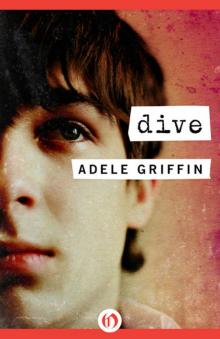 Dive
Dive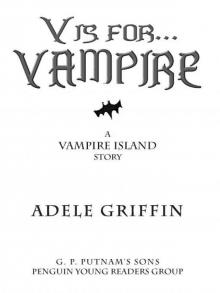 V is for...Vampire
V is for...Vampire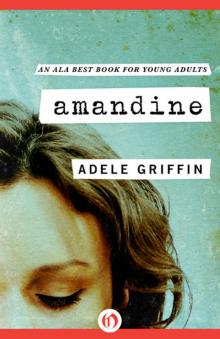 Amandine
Amandine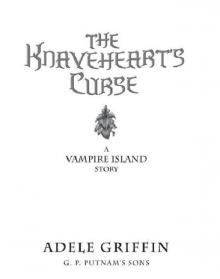 The Knaveheart's Curse
The Knaveheart's Curse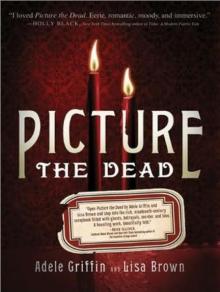 Picture the Dead
Picture the Dead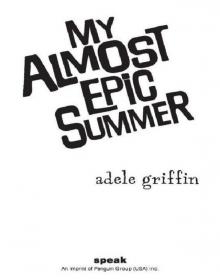 My Almost Epic Summer
My Almost Epic Summer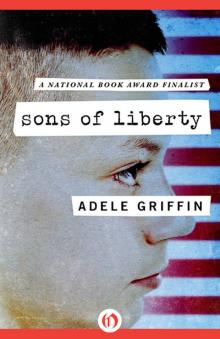 Sons of Liberty
Sons of Liberty Overnight
Overnight Witch Twins
Witch Twins Witch Twins and the Ghost of Glenn Bly
Witch Twins and the Ghost of Glenn Bly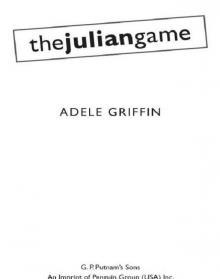 The Julian Game
The Julian Game Other Shepards
Other Shepards Split Just Right
Split Just Right Vampire Island
Vampire Island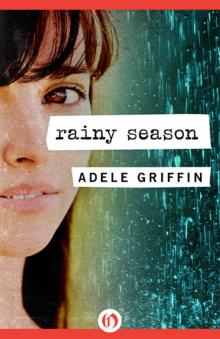 Rainy Season
Rainy Season Hannah, Divided
Hannah, Divided Where I Want to Be
Where I Want to Be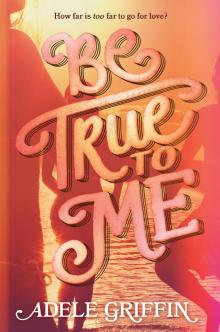 Be True to Me
Be True to Me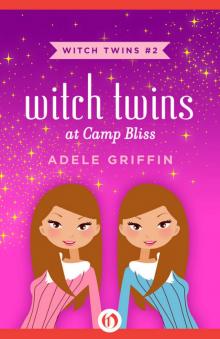 Witch Twins at Camp Bliss
Witch Twins at Camp Bliss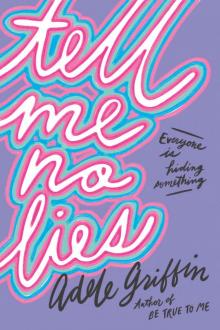 Tell Me No Lies
Tell Me No Lies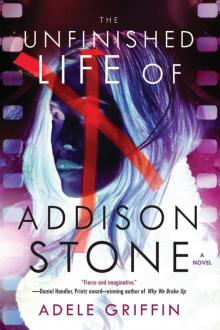 The Unfinished Life of Addison Stone
The Unfinished Life of Addison Stone